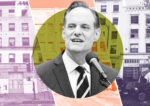A court-ordered receiver has approved an offer by the AIDS Healthcare Foundation to buy six hotel and apartment buildings for homeless residents on L.A.’s Skid Row for $27 million.
The Hollywood-based nonprofit, the world’s largest charity for those with AIDS, bought the buildings containing 415 units from the Skid Row Housing Trust, the Los Angeles Times reported.
The purchase includes the Boyd, Hart and St. George single-room occupancy hotels, and the Lincoln, New Carver and Rainbow efficiency apartments. The deal, expected to close as early as next month, works out to $65,060 per room or unit.
Under the deal, the foundation would continue to operate the buildings as permanent housing for formerly homeless residents.
The deal comes a month after the AIDS Healthcare Foundation made a top bid of $53 million to buy the first dozen of 17 buildings owned by the trust, which ran into financial trouble a year ago. The organization is now in receivership.
The sale of six of those buildings is in the best interest of all parties, including tenants and creditors, Kevin Singer, president of Receivership Specialists, said in a document filed Monday in Los Angeles Superior Court.
The purchase makes the AIDS Healthcare Foundation among the biggest landlords for homeless housing in Los Angeles.
The foundation, which makes more than $2 billion a year largely from its pharmacies, since 2017 has spent nearly $200 million on 16 properties with about 1,500 units in and around Skid Row. It has poured another $30 million into renovations and repairs.
But the nonprofit developed a problematic history of operating low-income housing, according to the Times.
A Times investigation last year found deplorable conditions in the buildings, while the foundation said it had lost more than $15 million over six years on operations.
In a letter to the receiver, state housing officials expressed concerns about the foundation’s track record in operating homeless housing.
The organization “would not be a suitable owner and operator considering widely known and well-documented shortcomings in the foundation’s ability to provide safe and well-maintained buildings,” Jennifer Seeger, a deputy director with the Department of Housing and Community Development, wrote in the March 20 letter.
The foundation says it has stepped in to address chronic homelessness where public agencies, the private market and other nonprofits have failed. The agency claims to have boosted the occupancy in its buildings by nearly 200 percent, while taking nearly 1,000 people off the streets and into permanent homes.
AHF doesn’t normally offer services in many of its buildings, citing the cost. The purchase and sale agreement calls for the foundation to maintain an outside property management firm for up to six months, and agree that it’s responsible to provide unspecified social services to tenants.
The agreement also calls for a two-year moratorium on enforcing code violations at the properties at the time of sale, so the foundation can revamp them without penalty, according to the Times.
The receiver has sold 11 of the trust’s 29 troubled properties to nonprofit affordable housing providers such as LA Family Housing and People Assisting the Homeless, or PATH, and hopes to transfer one more.
Singer has put the remaining 17 trust buildings, including SROs with bathrooms down the hall, up for sale.
Of the foundation’s $27 million offer, $5 million would fund ongoing repairs at the six buildings, and $10 million would repay part of the city’s debt. The remainder would go toward paying for receivership operations until the remaining properties are sold. Singer said he’s negotiating with two other bidders for six other buildings.
— Dana Bartholomew
Read more


